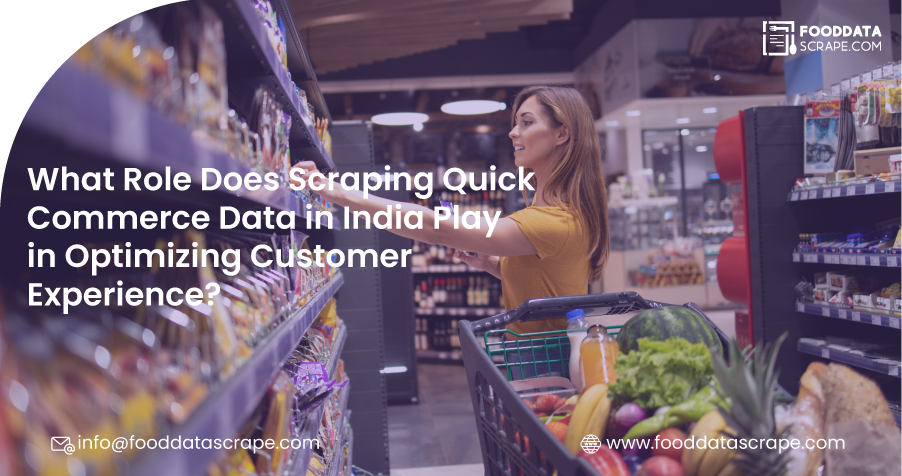Introduction
India has experienced an extraordinary revolution in FMCG in recent years, which has been a result of this recent boom in the quick commerce platform. Quick Commerce Data Scraping for FMCG Trends is one of the major contributors to this change. It is also commonly known as q-commerce, which provides ultra-fast delivery services, most of which promise to get the product within minutes. The rapid growth of platforms like Blinkit, Zepto, and others has revolutionized how consumers purchase daily essentials, offering convenience, affordability, and efficiency.
At the heart of this revolution is data—more accurately, data-scraping technologies that enable the effective extraction of live, valuable information online. Stakeholders in the FMCG sector gain deep insights by scraping key information from these quick-commerce platforms and can learn about pricing and demand patterns with inventory status, etc. Quick Commerce and FMCG Delivery Trends in India have become more vibrant and data-enabled than ever and are now set to make far smarter decisions that optimize operations further.
This article discusses how Quick Commerce Data Scraping will revolutionize the delivery of FMCG in India and its implications for businesses, consumers, and the entire supply chain ecosystem.
The Rise of Quick Commerce in India
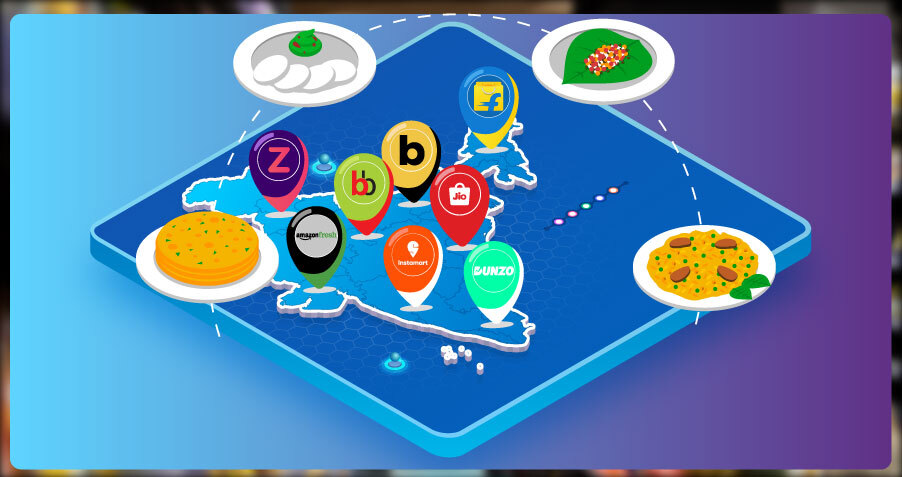
Quick commerce has picked up amazingly in India, especially in the urban regions, where the demand for high levels of convenience is quite pronounced. Busy lifestyles and increased dependency on technology make consumers more prone to using online platforms for their everyday essentials, such as groceries, personal care items, and packaged food.
The increase in revenues of companies such as Amazon and Flipkart proved to be a stepping stone for q-commerce. Their hyper-localized delivery systems, often within minutes, enable consumers to order groceries, snacks, beverages, toiletries, and much more without leaving their homes.
Exploring this demand, platforms like Blinkit, Zepto, Swiggy Instamart, Dunzo Daily, BigBasket Now, Flipkart Minutes, Amazon Fresh and JioMart have successfully provided delivery in nearly a second. These platforms use data analytics, machine learning, and powerful algorithms to analyze demand, optimize inventory, and bring products to their customers in time. FMCG Quick Commerce Data Analytics in India plays an important role in this, enabling companies to track live data on product availability, customer preferences, and market movements.
Scrape all that data through such platforms to find how pricing is shifting, whether demand shifts are present or supply chain dynamics in real time. Harnessing that power is necessary for one to understand trends about Quick Commerce Trends in FMCG Delivery India with actionable insight both into making an organization function smoothly and increasing its customer satisfaction quotient.
The Role of Data Scraping in Quick Commerce
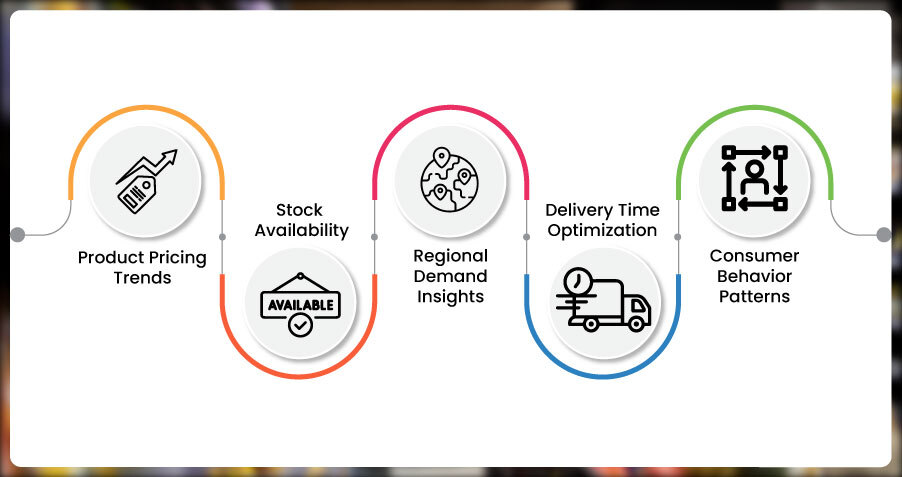
Web Scraping Grocery Delivery Data automatically collects structured data from websites, which is then analyzed and used for various business applications. In the context of quick commerce, data scraping plays an essential role in monitoring and analyzing key factors such as:
- Product Pricing Trends: Regularly monitoring prices across different platforms provides insights into price fluctuations, discounts, and promotional offers. Price sensitivity is crucial in the FMCG sector, and tracking these trends allows businesses to stay competitive.
- Stock Availability: Real-time monitoring of stock levels ensures that businesses can identify which products are in high demand or out of stock. This data can be used to optimize inventory management and predict consumer behavior.
- Regional Demand Insights: Since quick commerce platforms often serve hyper-local areas, understanding regional price variations, popular products, and delivery times can help businesses tailor their strategies based on geographic trends.
- Delivery Time Optimization: Quick commerce is all about speed, and data scraping can help monitor delivery times, enabling platforms to streamline their logistics operations and improve customer satisfaction.
- Consumer Behavior Patterns: By tracking consumer purchase history, order frequency, and preferred delivery times, businesses can optimize their marketing strategies and personalize their offerings.
Revolutionize your Business Using Quick Commerce Data Scraping with Food Data Scrtape.
Benefits of Quick Commerce Data Scraping for FMCG Delivery
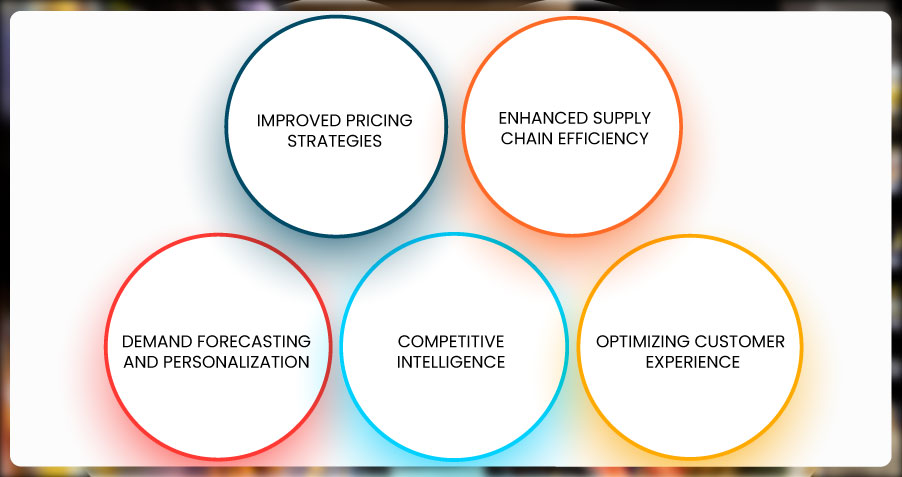
- Improved Pricing Strategies: Pricing is one of the most critical elements in the FMCG sector. Given the vast array of products and constant changes in demand, businesses need to adopt dynamic pricing strategies aligned with market realities. Data scraping enables companies to track competitor prices, spot discounts, and offers, and adjust their pricing models accordingly. This helps businesses stay competitive in an industry where margins are often less and consumers are highly price-sensitive. Businesses can make informed decisions about pricing, promotions, and discounts by analyzing real-time pricing data. For example, businesses can quickly adjust their pricing strategy to capture market share if a competitor offers a significant discount on a popular snack. In this way, data scraping helps companies maintain optimal pricing while improving their bottom line. Quick Commerce Data Scraping Services are vital in helping businesses achieve this level of insight and flexibility.
- Enhanced Supply Chain Efficiency: The FMCG supply chain is highly complex and fast-paced, involving manufacturers, distributors, wholesalers, and retailers. Quick commerce platforms, in particular, face the challenge of ensuring that products are stocked in sufficient quantities and delivered within minutes of an order being placed. Data scraping from platforms like Blinkit and Zepto offers valuable insights into stock levels, product demand, and delivery schedules. By scraping this data, businesses can optimize inventory management, ensuring that popular items are always available while reducing the risk of overstocking products with low demand. Additionally, real-time insights into delivery times and logistical bottlenecks allow platforms to streamline their operations, ensuring that orders are delivered as quickly and efficiently as possible. With Grocery Delivery Scraping API Services , businesses can continuously gain these critical insights.
- Demand Forecasting and Personalization: Understanding consumer demand is crucial for any FMCG business, particularly in the fast-paced world of quick commerce. Data scraping provides insights into shifting consumer preferences, allowing businesses to forecast demand more accurately and optimize product assortments. For instance, if there is a surge in demand for cleaning supplies during a particular season, businesses can anticipate this demand and ensure that their inventories are stocked accordingly. Furthermore, analyzing purchase patterns can help personalize marketing campaigns and promotions. For example, if a customer frequently orders specific snack brands, a business can target them with relevant offers or discounts, improving conversion rates and customer loyalty. With a Grocery Price Dashboard , businesses can monitor trends and optimize their product offerings accordingly.
- Competitive Intelligence: The FMCG market is highly competitive, with numerous players vying for market share. In such a crowded space, understanding what competitors are offering and how they are pricing their products is essential for success. Data scraping enables businesses to track competitor pricing, promotions, and product offerings across platforms like Blinkit and Zepto. With this competitive intelligence, businesses can fine-tune their marketing campaigns, product positioning, and pricing strategies. If a competitor introduces a new product at a competitive price point, scraping data allows a company to respond quickly, whether by launching a similar product or offering a better deal. This agility is crucial for staying ahead in a rapidly changing market. Grocery Price Tracking Dashboard can help businesses monitor these trends in real-time, making adjustments to maintain a competitive edge.
- Optimizing Customer Experience: Quick commerce is primarily driven by the need for speed and convenience. If a customer places an order and experiences a delay in delivery or finds that their preferred product is out of stock, it can result in dissatisfaction and a lost sale. Data scraping allows businesses to monitor delivery times and stock levels, providing insights into potential delays or supply chain issues. By using this data proactively, platforms can improve operational efficiency, streamline logistics processes, and meet customer expectations. Additionally, data scraping can help businesses understand customer preferences, enabling them to personalize their offerings and enhance the overall customer experience. Using Grocery Pricing Data Intelligence , businesses can continuously monitor these elements, making necessary improvements for optimal customer satisfaction.
The Future of Quick Commerce and Data Scraping in FMCG
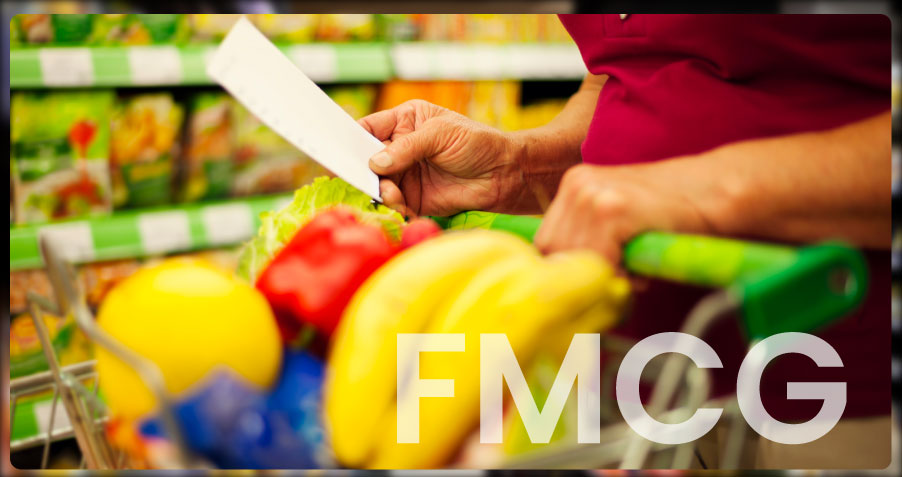
The quick commerce sector is poised for rapid growth in India, with increasing internet penetration, urbanization, and a young, tech-savvy population driving demand for ultra-fast delivery services. As more businesses enter the quick commerce space, data scraping will become even more critical in staying competitive.
Artificial intelligence and machine learning technologies will play an increasingly important role in analyzing the vast data generated by scraping. These technologies will enable businesses to gain deeper insights, predict consumer behavior, and automate decision-making processes. For instance, AI can predict which products will likely be in demand based on historical data, weather patterns, or even local events, ensuring that inventories are optimally stocked. Furthermore, as supply chains become more integrated and automated, real-time data scraping will be crucial for ensuring that products are delivered on time and customer expectations are met consistently.
Conclusion
Quick commerce data scraping is transforming the FMCG delivery landscape in India by providing businesses with real-time insights into pricing trends, inventory levels, consumer behavior, and supply chain dynamics. By harnessing the power of data, businesses can optimize their pricing strategies, improve customer experiences, and stay ahead of the competition.
As the demand for fast and convenient deliveries continues to rise, data scraping will become an indispensable tool for companies operating in the FMCG sector. The ability to quickly analyze and respond to changing market conditions will be a key differentiator for success in India's fast-evolving world of quick commerce.
Are you in need of high-class scraping services? Food Data Scrape should be your first point of call. We are undoubtedly the best in Food Data Aggregator and Mobile Grocery App Scraping service and we render impeccable data insights and analytics for strategic decision-making. With a legacy of excellence as our backbone, we help companies become data-driven, fueling their development. Please take advantage of our tailored solutions that will add value to your business. Contact us today to unlock the value of your data.






















































































